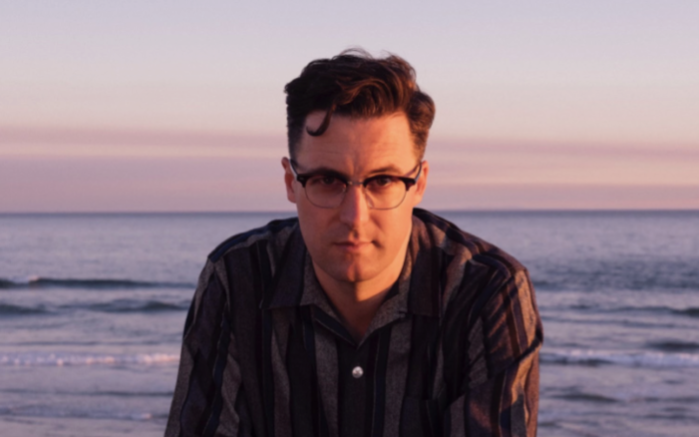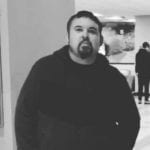
“I was in this surreal bunker life where we were in the studio until we legally couldn’t, we’d be leaving at three in the morning and there was the National Guard.”
The latter half of the 2010s saw soul music make a big comeback. This revival is still felt in our current decade and Los Angeles’ Nick Waterhouse is one of the acts leading the charge, adding his own swing to the classic style with a songwriting that incorporates rhythmic energy and takes the senses for a ride.
Waterhouse recently released his fifth album, Promenade Blue, which finds him adding various new elements to his polished aesthetic. On August 16 at City Winery Boston, he’ll perform with his band as part of a tour in support of the new record.
Waterhouse and I recently spoke about being the vessel for a musical spirit, putting the finishing touches on the new album during the pandemic, possibly releasing leftover tracks, and how he’s feeling ahead of his upcoming run of shows.
You’ve cited jazz and blues pianist Mose Allison, blues legend John Lee Hooker, and Jim Morrison from the Doors as early influences in your musical development. Going from that time to now, how have you been able to forge this variety of influences into this soul sound that you’ve harnessed?
My participation in playing, listening, and collecting music while being around the record shop and knowing hundreds of musicians has always made me aware that music that’s formed by jazz or blues is part of this network of tributaries. You can view it as water and what water gets turned into, which is electricity and energy and it’s flowing through a network of a bunch of different means. It’s not to say that I sit around and trip myself out on sort of the cosmic elements of that, it’s more like understanding that there are spirits in all types of music that transcends genre. I think a big part of my influence as I reflect on it, especially now as I’ve worked as much as I have and have played with so many people, is attempting to act as another conduit for that spirit.
While listening to Promenade Blue, it really wowed me due to it having a bombastic horn section and an orchestral string quartet backing you up. Were you trying to capture that classic Motown or Muscle Shoals sound? Or did you have a different vision going into it?
I wasn’t trying to capture any specific thing, but what you hear on the album on tracks like “Place Names” and “To Tell” is this feel that has elements of a blue note in it. J.B. Flatt who did the arrangements for me has been a touring member of my band for seven years and he really understands the linguistics of what I’m into and what is hip and what is unhip to me. Having this sort of straightened out but still bluesy inferred swung feel is the key to making that work and listeners will probably notice that this is the first record with strings in it. It feels like every time I get to work on an album a lot of it is on-the-job learning where I would be like, Cool, we’re really gonna go for it on this one. We really had an amazing time, there were four players who were all incredibly talented and they came in and bashed it out in a day with J.B. at the helm and Paul Butler in the control room.
It’s really about what gets me and what’s my horn, that really added a layer of excitement for me while keeping things interesting after a lot of avenues I’ve pursued sonically. It was a totally new flavor.
That’s what really struck me while listening to the orchestral strings, the horns, and that combination throughout the whole record. How did you go about getting these other musicians involved in the recording process? Did COVID-19 create any obstacles or was the album made before the pandemic?
It did. I was anticipating doing this Memphis session, then cutting a bunch of songs in Los Angeles and then picking and choosing from both recordings. Of course, we get to Memphis with a bunch of killer players and we have a surplus with four or five songs left over. That was all in February, quite literally it was a very surreal sort of pre-pandemic moment where for about a year I didn’t know if I was ever going to make a record again. That was a pretty good way to do it because I was in Memphis in a great room with both familiar players who have been with me for a long time and new people. COVID-19 short-circuited the process in a weird way where we tracked everything and it was the day we were supposed to start doing vocal overdubs and mixing that lockdowns really started hitting very hard.
It’s funny to reflect on this because we were so uncertain at the time of what the hell was going on but we had just flown back to LA right before they started shutting down airports. In this weird way I gave myself a project for the first two months of the pandemic so I was in the cave while everyone else was paying attention to the impending global crisis. I was in this surreal bunker life where we were in the studio until we legally couldn’t, we’d be leaving at three in the morning and there was the National Guard and crazy shit.
Wow.
Yeah, it really is a record of the last type of music I would make before COVID-19, I don’t know if I would make the same record now. It was all of us playing together in a room, we were finishing up the record with masks on while being socially distanced and that was a struggle. We were in this migratory pattern where we couldn’t even get into studios at a certain point so we were setting up secret, improvised mixing console situations in incredibly rusticated places that were slightly out of town and there was no phone service and no hot water.
You just mentioned how you have some tracks left over from the sessions so do you plan on using those tracks for an EP in the future?
I’d really like to, I have stray outtakes from previous records where if the spirit didn’t move me to add anything else to them I’d just leave them alone until they make sense. I was thinking about picking up where I left off with these tunes but we’re going to have to see where the rest of the year unfolds. It’s been really strange promoting this record, it almost feels unreal or in suspended animation. My head is still focused on the album and I had to learn all of these songs for these shows I’m doing. When I play Boston it’ll be the first time I’ve performed live in almost two years so my head is still thinking about sequencing the concept of this record even if I’m not actively doing it.
The upcoming show at City Winery is the first one of a tour that will eventually have you doing a ton of dates in Europe. What are your feelings going into it after such a long time of being off the road? Are you excited? Are you nervous? Are you a mix of both?
I’m a mix of both. “Place Names” is sort of all about this, the chorus says, “Learn to let things go, say hey blow wind blow” and it’s quite literally the feeling I’m talking about. It’s about loosening your grip on things because you cannot control how fate unfolds. A lot of getting a show together is having to build up some muscle memory while rehearsing a band, giving them the material, assembling great musicians, and you just let it flack a little bit because that’s the zone you gotta be in to play. I’ve been really having to relax my holding muscles for these shows but I’m excited, it’s going to be really nice to be in that place again with the people that are going to be playing.
I’m really thrilled because these shows at City Winery are specifically special because they’re with the drummer who made Promenade Blue with me, Jason Smay. He doesn’t usually tour with me but the entire band who made the record will be doing these songs. As far as Europe and all of that goes, the future is still incredibly uncertain, so let it be what it is.
Rob Duguay is an arts & entertainment journalist based in Providence, RI who is originally from Shelton, CT. Outside of DigBoston, he also writes for The Providence Journal, The Connecticut Examiner, The Newport Daily News, Worcester Magazine, New Noise Magazine, Northern Transmissions and numerous other publications. While covering mostly music, he has also written about film, TV, comedy, theatre, visual art, food, drink, sports and cannabis.

